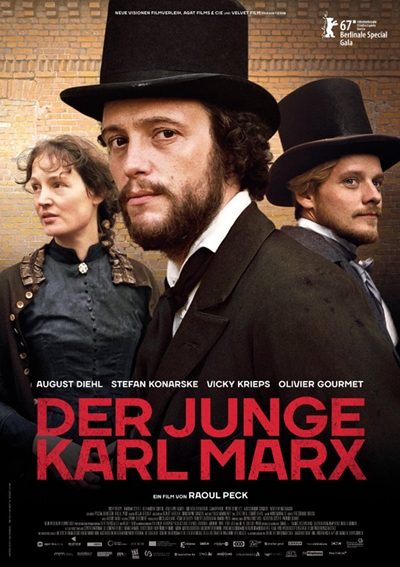The Young Marx: Film by Raul Peck
- By Heiko Khoo
 0 Comment(s)
0 Comment(s) Print
Print E-mail China.org.cn, April 2, 2017
E-mail China.org.cn, April 2, 2017
|
|
|
Poster of Raoul Peck's latest film "The Young Marx" |
"The Young Marx," a film by Raoul Peck, a left-wing Haitian director, examines Karl Marx's life and ideas in the period from 1843 to 1848.
The first scene re-enacts the events covered in an article written by Marx, which protests against a ban on peasants collecting fallen branches in the forest, for use as firewood. Club-wielding riders gallop towards their victims - spreading terror. Heavy thuds are heard as skulls are cracked, and bodies fall to the ground, their dying faces contorted with expressions of disbelief and injustice.
At the time, Karl Marx (August Diehl) wrote for, and later became the editor of a radical newspaper called the Rheinischer Zeitung. His articles were seen as a direct challenge to the authorities of a divided German nation, in which feudal power held sway and was maintained by violence and repression.
Marx's restless and critical mind searches for an outlet through which he can freely express his thoughts and contribute to the intellectual ferment of the times.
He moves to France to pursue a new publishing project - The German French Yearbook - and joins the fray of heated debates within socialist and communist circles thriving in Paris in 1844.
His beloved wife, Jenny von Westphalen (Vicky Krieps), is sympathetically portrayed as a bright and iconoclastic woman, perfectly capable of participating on an equal footing in male intellectual debates, and offering her own insights and ideas.
Friedrich Engels (Stephan Konarske) is pictured in Manchester at his father's cotton thread factory. He is an uncomfortable figure, torn between radical ideas and material interests. His quest to escape from the bourgeois values and beliefs of his father draw him inexorably towards the lower orders of society.
The real life of the working class in England is opened up to him after he seeks out Mary Burns (Hannah Steele), an Irish factory worker who becomes his lover. Her fiery militancy and connections to the proletarian underworld allow him to gain the insights of an anthropologist going native.
The fruit of his expedition into the bowels of Manchester proletariat life was "The Condition of the Working Class in England" published in 1845. This book acts as Engels' passport, granting him entry through the prickly frontiers surrounding Karl Marx's intimate world.
Marx and Engels disappear in drunken interludes which not only produce a fundamental re-examination of society, based on material production and class relations, but also seek to change the world.
The central debates within the socialist and communist movement prior to 1848 are subtly presented, with Joseph Proudon and Wilhelm Weitling, assuming the leading roles as the protagonists of utopian forms of socialism and communism.
Weitling proposes harmony between the classes, and his organization, The League of the Just, advocates egalitarian values based on moral appeals and rationality.
Marx and Engels, however, believed the material interests of the capitalists and workers involved an irreconcilable contradiction, and only the unity of the working class could prepare for a seizure of power and lay the basis for a communist society.
The didactic elements of the film are certainly a success, in the sense that no effort is required to grasp apparently complex issues, and to realize their relevance today.
However, viewers inevitably compare any period drama setting with others that evoke the same ages and places. In this field, the film's achievements are a little sketchier. It was filmed in French, English and German, and it is definitely preferable to see the multilingual version.
However, the story also contains numerous embellishments, which Peck inserted, and which amend or change the actual timeline of events. Whilst they do not diminish the quality of representation of substantial issues or ideas, and are inserted for dramatic effect, I do think they add sufficient humor or drama to be justified.
After all, as Marx's historical legacy is still such a ferociously-contested terrain, why is there a need to add anything that distorts it? However, Peck has done a great job in bringing Karl Marx and the development of his ideas to the big screen.
Indeed, it is astounding that no one has made a film about Marx's life before. In addition, by restricting himself to a short historical period, Peck is inviting others to engage the subject.
Heiko Khoo is a columnist with China.org.cn. For more information please visit: http://www.ccgp-fushun.com/opinion/heikokhoo.htm
Opinion articles reflect the views of their authors, not necessarily those of China.org.cn






